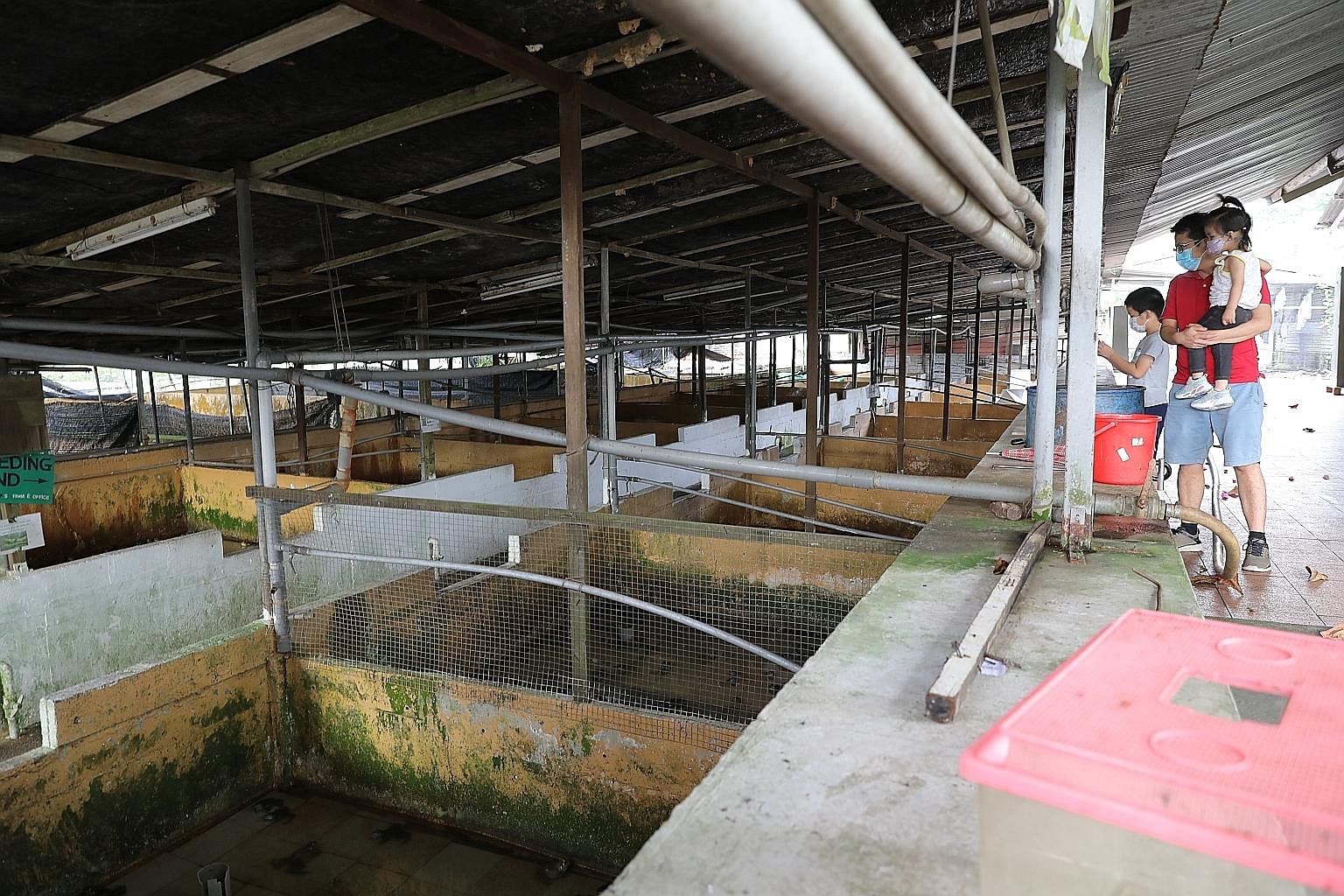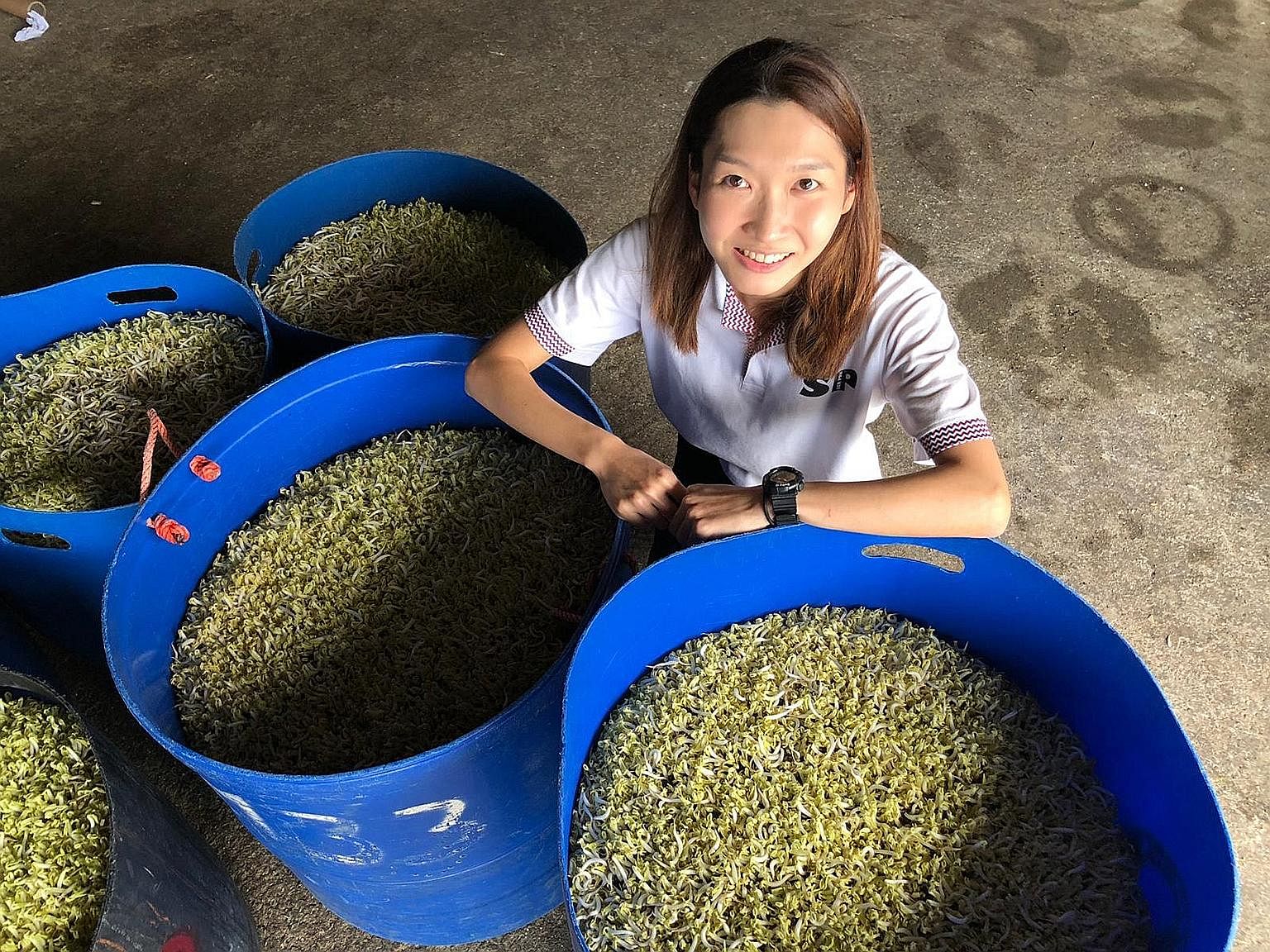Lim Chu Kang set to be redeveloped into high-tech agri-food cluster: SFA
Sign up now: Get ST's newsletters delivered to your inbox
SINGAPORE - The Lim Chu Kang area looks set to be transformed into the Singapore's food bowl, as the country ramps up its drive to produce more food locally as a buffer against global supply shocks.
About 390ha of land there will be redeveloped under a masterplan to create a "high-tech, highly productive and resource-efficient agri-food cluster", said the Singapore Food Agency (SFA) on Friday (Oct 2).
It added that this will make the Lim Chu Kang area - currently home to a number of traditional farms - more productive.
Currently, an average vegetable farm in Singapore occupies around 2ha of land and produces about 130 tonnes of vegetables per hectare every year.
But the SFA said a high-tech vegetable farm has the potential to produce over 1,000 tonnes per hectare every year with less than one hectare of land.
The food agency added that with redevelopment, the Lim Chu Kang area could more than triple its current food production.
It will consult stakeholders such as farmers and agri-food experts over the next two to three years.
Development works are expected to commence in 2024 and will be carried out in phases, added the SFA in a statement.
The food agency was giving details on the transformation of Singapore's rural north-west, following an announcement in March this year that the Lim Chu Kang agriculture area will be planned and redeveloped to enhance food production.

In 2019, there were 111 licensed land-based food farms, many of which are clustered around the north-western part of Singapore.
SFA chief executive Lim Kok Thai said: "We aim to create a vibrant and attractive agri-food cluster where global best-in-class agri-food companies, the next generation of agri-tech workers, and visitors will be excited to work in and visit."
Redeveloping Lim Chu Kang
All farms currently in the Lim Chu Kang area will be able to stay on to the end of their leases, the SFA said.
Ten food farms and 13 non-food farms, whose leases are expiring between this year and 2022, will be offered a short-tenancy extension, after which the land will be redeveloped in line with the masterplan, the SFA said.
One food farm and two non-food farms whose leases are expiring between 2026 and 2027 will be allowed to continue until their leases expire, said the agency.
The SFA and National Parks Board (NParks) will work closely with these farms to support their transition plans. Some non-food farms, such as ornamental fish farms and nurseries, fall under the purview of NParks.
Singapore currently produces less than 10 per cent of its own food, although the plan is to boost this to 30 per cent by 2030.
The food agency said the Republic's high reliance on food imports makes the country vulnerable to disruptions in global supply chains.
"The ongoing Covid-19 global pandemic has underscored the importance of ensuring that we have diversified sources and resilient food supply chains," added the SFA.
Other than importing food from a diverse range of countries and territories - more than 170 to date - local production is a key pillar of Singapore's food security strategy.
The redevelopment of Lim Chu Kang will help the local agri-food sector develop sustainable, highly productive and industry-leading farms of the future, strengthening food security and creating jobs, the SFA said.
To this end, the food agency will look into the development of shared facilities in the Lim Chu Kang area to lower costs of production and resource use, as well as put in place water, electricity and transport infrastructure to support high-tech farming systems and attract a new generation of agri-tech skilled workers.
"We will also explore how we can conserve the use of resources and minimise waste by adopting circular economy principles," it added.
This could include, for example, using animal waste from one farm as fertiliser for another.
Agri-food production will be the key focus of the masterplan exercise, but the agency will look into how to incorporate and support other elements, such as farmers' markets and education tours.
The SFA said the Lim Chu Kang masterplan does not encroach into the recently announced Sungei Buloh Nature Park Network, which includes Sungei Buloh Wetland Reserve and Kranji Marshes.
The food agency will be conducting an environmental study at the end of this year and will work with nature groups to better understand the ecosystem of flora and fauna in the area.
The study is expected to be completed in mid-2021 and findings will be taken into consideration as part of its masterplan exercise.

Jurong Frog Farm in Lim Chu Kang. The SFA will consult stakeholders such as farmers on the development of the masterplan over the next two to three years.
ST PHOTOS: ONG WEE JIN
Farmers respond
Farmers welcomed news of the Lim Chu Kang redevelopment, saying the plans to upgrade the infrastructure in the area is timely.
Singapore Agro-Food Enterprises Federation's (Safef) vice president Mr Chew Chee Bin noted that roads in the area are currently "very narrow", for example. He said aside from roads, water, power and sewage infrastructure need to be improved as farms leverage more technology to boost yields.
Safef is a not-for-profit organisation comprising farms from the food fish, livestock and vegetable sectors of the industry, as well as industry associates.
Said Mr Chew: "Our industry feels there is a need to upgrade the infrastructure. Power supply, sewage, are critical for high-tech farms."
Ms Jean Woon, 31, manager of Ser Poh Farm, said that her 1.2ha beansprouts farm will be moving from its current location at Lim Chu Kang to a new plot of land at Sungei Tengah by the third quarter of next year, with plans to double the farm's current output.
The farm, which harvests bean sprouts and soybean sprouts, will have access at its new location to a more comprehensive range of technology, as well as upgraded equipment and space planning to improve its efficiency.

Ms Jean Woon, manager of Ser Poh Farm, which will be moving from Lim Chu Kang to a new plot in Sungei Tengah. The farm plans to double its beansprout output through the use of technology such as auto-irrigation systems.
PHOTO: SINGAPORE FOOD AGENCY
"The new farm will have incorporated technology such as auto-irrigation, auto-packing and vacuum cooling systems, which can collectively improve the productivity and quality of our produce," she said.
Other farmers that The Straits Times spoke to say the masterplan shows how seriously the Republic is taking food security.
This gives farmers the confidence to invest in high-tech and more productive solutions, as they are assured that the authorities have a broader plan for the sector in Singapore, said Mr Kenny Eng, director of the Nyee Phoe Group, a horticultural business.
"Covid-19 has shown us that even if we have money, we cannot buy food. And a true blue Singapore food story is critical," said Mr Eng.
He added that the authorities are doing the right thing by engaging stakeholders in the area.
Quail farmer William Ho, president of farmer coalition Kranji Countryside Association said having the right infrastructure could lead to better use of resources between farms.
"For example, the dung from my quails could be used for biogas that can be used in generating power," he explained.


